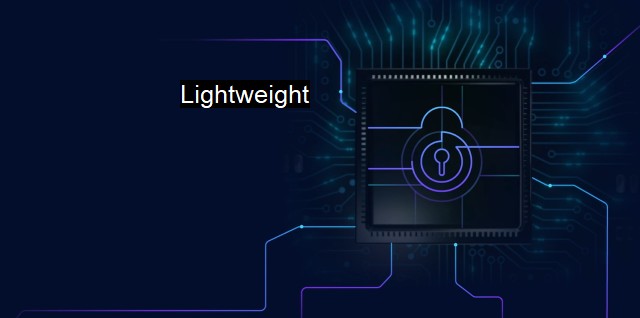What is Lightweight?
The Rise of 'Lightweight' Antivirus Software: Safeguarding Devices and Networks in the Cyber Age
Lightweight refers to software engineered to consume less machine resources, such as computer processing power, memory, or storage space when compared to traditional antivirus suites. Lightweight cybersecurity also includes a focus on less demanding necessities such as fewer system updates, simpler running processes, and less network bandwidth usage.The concept of lightweight cybersecurity can be considered from two angles – software complexity and performance impact. Software complexity refers to the fundamental design of the program causing overuse and strain on system resources, while performance impact involves how much drag the software causes when processing scan functions or updates.
Lightweight cybersecurity tools are increasingly significant as traditional antivirus programs are commonly criticized for their resource gluttony, disruptive scanning processes, and voluminous updates that often slow down system functionality. Computer devices often struggle and sluggishly operate due to the added burden of conventional antivirus processes. Hence, bulky security software poses hurdles for users who work with systems possessing restricted or limited resources.
This concern has steered software developers and computer protective solution professionals to take a more streamlined approach when creating antivirus and cybersecurity packages. By prioritizing design efficiency, lightweight cybersecurity software provides equally robust levels of data and network safety without consuming excessive mass processing capacity.
Lightweight cybersecurity software typically exploit innovative technologies to offer such efficient security. One of these technologies is cloud processing. Lightweight cybersecurity software utilizes the edge that cloud computing copiously delivers. Protective scans, continuous round-the-clock screening, and data analysis that usually would rest heavily on local resources occur as an alternative in the cloud. With the remote, colossal computing power of a network of servers, a user's system isn't congested with burdensome functionalities. Yet, the standard of security to the end consumer is maintained and often enhanced further than continuous local scanning could provide.
Besides the resort to cloud processing, other prevalent approaches in lightweight cybersecurity software also stay considerate of system performance. Notably, the implementation of whitelist methodology hastens scanning speed. Whitelisting blocks unauthorized code by default and only permits stress-free operation of predefined, familiar software. Meanwhile, characteristic based antivirus scans identify characteristic malicious behaviors over taxing virus definition databases.
Various multinational corporations and startups are constructing lightweight cybersecurity apps to cater to users who need rigorous security solutions while preserving system performance. The race is on to develop cutting-edge lightweight security apps to provide enterprise-grade protection while ensuring PC and mobile devices maintain peak operating capabilities.
Given the extraordinary growth of technology and its expansion into every facet of contemporary life, pragmatic and efficient cybersecurity is a requisite. Lightweight cybersecurity offers rigidity without slowing systems down, utilizing the power of cloud computing along with modern coding methodologies to achieve superior security outcomes. It is fueling the growth of real-world, practical, and necessary computer security developments that are vital considering the evolving forms of online threats and the increasing need for a lightweight antivirus solution.

| | A | | | B | | | C | | | D | | | E | | | F | | | G | | | H | | | I | | | J | | | K | | | L | | | M | |
| | N | | | O | | | P | | | Q | | | R | | | S | | | T | | | U | | | V | | | W | | | X | | | Y | | | Z | |
| | 1 | | | 2 | | | 3 | | | 4 | | | 7 | | | 8 | | |||||||